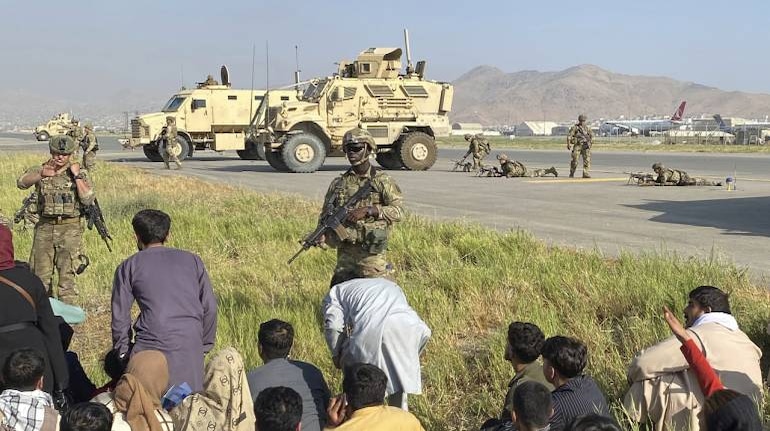



Today, August 19, Afghanistan celebrates its Independence Day to mark the 1919 victory of King Amanullah Khan in the Third Anglo-Afghan War. This year, however, it is not sure if Afghans will be in a celebratory mood after witnessing how rapidly their elected, civilian government collapsed with the Taliban capturing power in Kabul on August 15.
With the United States withdrawing its troops, the Taliban was expected to gain an upper hand, but none expected the civilian government, government institutions, especially the 300,000 strong Afghan forces, to crumble like a house of cards. The US has rightly been criticised for the timing and the manner of its withdrawal from Afghanistan which has led to chaos across the country.
A Lack Of UnderstandingThis failure can be attributed to how the US treated Afghanistan as a colony, undermining its government, to the point of keeping it in the dark about the February 2020 deal, particularly on the question of the release of over 7,000 Taliban prisoners.
What has brought things to such a pass is Washington’s lack of understanding of Afghanistan, its people and cultural sensitivity, the lack of co-ordination between the Afghan army and Nato forces, and the heavy reliance of local forces on US air power. This was why once the air support was withdrawn the Afghan army personnel could not hold ground for long.
Also, in its zeal to instil democracy, the West failed to realise that rather than a centralised presidential system of governance which led to tension among regional leaders, what suited Afghanistan more was a federal system. The December 2001 Bonn Conference and the subsequent Loya Jirga of 2004 called most warlords and important tribal leaders, except those associated with the Taliban, thus wasting an opportunity to form an inclusive government.
Taliban RegroupsFor a brief period in the 2001 it seemed that stability and prosperity would return to Afghanistan as the Taliban was forced to retreat to the Af-Pak region. However, indiscriminate night raids, target killings, and mindless bombing of village gatherings made the US and the civilian government in Kabul unpopular. This distrust was particularly evident in the Pashtun-dominated rural areas in the East and South, bordering Pakistan and Iran, respectively.
The Taliban, which had covert support from Pakistan’s Inter-Service Intelligence (ISI), capitalised on this to regroup and it soon became a strong force in rural areas, with sleeper cells in urban centres, including Kabul.
Corruption And InfightingTo make matter worse, successive governments in Kabul were plagued with massive corruption. Even as most Afghans remained poor, ministers, governors and top bureaucrats lived luxurious lives.
Ashraf Ghani, the President who fled Kabul on August 15, was also accused of running the government with his small circle of western-educated technocrats, thus sidelining regional leaders. Afghanistan remains an ethnically-divided society and Ghani aggravated those fault lines rather than forging alliances.
In addition to these charges, allegations of fraudulent elections and infightings among politicians further eroded the trust in the civilian government.
Missed OpportunitiesAs it became clear that the US wanted to withdraw at any cost from Afghanistan, and the Taliban was gaining international legitimacy, the Ghani administration failed to grab the opportunity.
A few rounds of intra-Afghan talks yielded little except an ‘agreement’ to continue the talks. A sticking point was the nature of the government: while Kabul insisted on continuing as an Islamic Republic, the Taliban insisted on an ‘Islamic Emirate’ where the constitution and laws will be based on the Sharia.
While many see the Taliban as rural, and conservative mullahs who act as Pakistan’s proxy, the war-hardened Taliban have learned the tricks of diplomacy, bargaining, and, most importantly, optimum use of international media as well as social media while remaining firm in its belief and commitment to what it sees as righteous cause.
The Ghani government was also slow on facilitating the process for forming a transition government to accommodate the Taliban into the system. He was more focused on elections and delayed the negotiations.
As the world waits with baited breath to see how the Taliban will run Afghanistan, it must not be forgotten that the people of Afghanistan have been failed by the United States, its international coalition partners and the political elite of Kabul.
M Reyaz is Assistant Professor, Aliah University, Kolkata, and has been focusing on Afghanistan for a decade now. Twitter: @journalistreyaz. Views are personal and do not represent the stand of this publication.Discover the latest Business News, Sensex, and Nifty updates. Obtain Personal Finance insights, tax queries, and expert opinions on Moneycontrol or download the Moneycontrol App to stay updated!
Find the best of Al News in one place, specially curated for you every weekend.
Stay on top of the latest tech trends and biggest startup news.